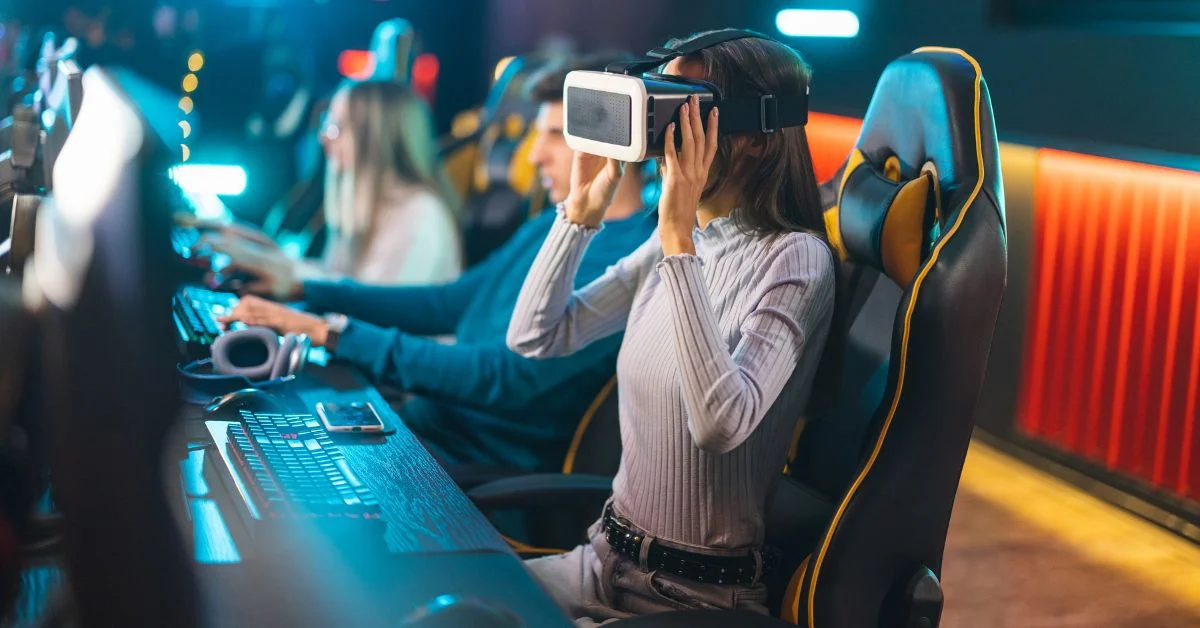If you’re searching for what DigitalRGS.org gaming truly offers, you’re likely looking for more than just another gaming platform. You want to understand how it differs, what makes it special, and why it’s gaining traction in both player communities and development circles. To answer your intent clearly: DigitalRGS.org is an emerging gaming ecosystem focused on integrating responsive game systems (RGS), where player behavior, device context, and AI dynamically reshape the gaming experience in real time. It’s more than a game hub—it’s a platform designed to learn, adapt, and evolve with you.
In this article, you’ll learn what DigitalRGS.org gaming really is, what it’s built on, how it’s changing the rules of game development, and what the future holds for this ambitious platform. Whether you’re a developer, a gamer, or just curious, this comprehensive exploration will give you fresh, detailed insights into a system that could redefine interactive entertainment.
Introduction to DigitalRGS.org Gaming
At its core, DigitalRGS.org gaming represents a radical shift in how games are designed, deployed, and played. The acronym RGS—Responsive Game Systems—underlines the platform’s purpose: to adapt gameplay in real-time based on a variety of inputs, including user interaction patterns, device capabilities, environmental data, and even emotional cues. Unlike traditional games that operate on static logic trees and pre-scripted behaviors, DigitalRGS.org titles evolve continuously, creating deeply personal gaming experiences.
This is not just about high-resolution graphics or cloud syncing. DigitalRGS.org gaming reimagines gaming as a living, reactive medium, capable of offering unique, unscripted narratives shaped by each player’s behavior.
READ MORE: Pedro Paulo Executive Coaching: Transforming Leadership in a Rapidly Evolving World
Origins and Conceptual Framework
The origin of DigitalRGS.org gaming lies in research initiatives that sought to overcome the stagnation of static gaming loops. Developers noticed that modern players wanted more than better visuals—they craved surprise, unpredictability, and meaningful agency.
Built on this insight, DigitalRGS.org was conceptualized as a system that:
- Integrates machine learning directly into gameplay logic
- Offers open, modular architecture for rapid prototyping
- Leverages device sensors (gyroscope, microphone, GPS) for context-aware mechanics
- Creates persistent in-game worlds influenced by real-world activity
Instead of updating games via patches, games on this platform adapt themselves continuously. One player’s path through a puzzle can subtly influence another’s version of the same challenge.
The Core Philosophy Behind RGS
Responsive Game Systems are built on four core tenets:
1. Personalization Over Prescription
Games adapt based on your play style, learning curve, and interaction patterns.
2. Contextual Intelligence
If you’re playing in a noisy room, the game may adjust audio cues. If your device’s battery is low, gameplay can shift to less resource-intensive modes.
3. Non-Linear Narrative Fluidity
Stories don’t just branch; they evolve. NPCs may remember your choices even if you restart the game.
4. Player-Generated Data Loops
Data from gameplay influences not only your experience but can inform other players’ in-game environments anonymously.
These pillars allow DigitalRGS.org to treat games as reactive systems—more like living stories than digital products.
Platform Structure and Interface
DigitalRGS.org gaming is not a single game but a multi-layered ecosystem. It consists of:
- A Central Gaming Hub: Where users access available titles, updates, community forums, and data analytics tools.
- RGS Middleware: A backend intelligence engine that interfaces with game logic to adjust outcomes dynamically.
- Cross-Device Compatibility: Mobile, desktop, VR, and AR integrations are embedded by default.
- Open API Gateway: Developers can plug in their own modules or extend existing mechanics through the RGS SDK.
The user interface is deliberately minimalist, focusing attention on the gameplay itself. Games load through progressive streaming, reducing device storage needs.
Dynamic Game Design in RGS
Designing a game on DigitalRGS.org requires a shift in thinking. Developers must consider response matrices instead of linear logic flows.
Example: A stealth game may adjust guard AI not just based on difficulty level but also on how aggressively a player moves through levels or how long they take to make decisions.
Gameplay Parameters:
| Design Element | Static Games | RGS Games |
|---|---|---|
| Difficulty Scaling | Manual | Dynamic, continuous |
| Enemy Behavior | Pre-scripted | Machine-learned responses |
| World Design | Fixed maps | Adaptive based on prior actions |
| Narrative | Branching | Evolving, procedural |
| Replayability | Limited | Near infinite |
Each session becomes an experiment, not just an experience.
Real-Time Learning: AI and Data Feedback
DigitalRGS.org gaming integrates real-time AI modules into every game’s operational core. These include:
- Behavior Mapping AI: Tracks player actions to identify play style
- Emotion Recognition (via optional webcam input): Adjusts tension, music, or lighting accordingly
- Environment Predictive Modeling: Changes weather patterns or ambient challenges in-game based on actual regional data
- Adaptive Music Engines: Soundtracks shift tone based on momentum, success, or failure patterns
The AI doesn’t dominate the experience—it scaffolds it, offering each player a version of the game that suits their skill and preference.
Ecosystem Features and Player Benefits
What makes this compelling for gamers?
- Tailored Challenge Levels: Frustration is minimized; engagement is maximized
- Organic Discovery: Secrets in games may appear only if your behavior suggests curiosity
- Real Replay Value: No two playthroughs are the same
- Decentralized Achievements: Progress benchmarks based on your personal journey, not a universal checklist
- Device-Aware Optimization: Game engine tweaks itself for smooth operation on your specific hardware
This isn’t just better gaming—it’s personalized play as entertainment architecture.
Developer Tools and API Accessibility
DigitalRGS.org gaming offers a full RGS Developer Kit (RDK) that supports:
- Scripting in Python, C#, or Rust
- Real-time debugging environments
- Scenario generators that test thousands of player models
- Modular AI templates that can be trained or adapted
This empowers indie creators to design intelligent games without building an AI core from scratch. The open documentation and a vibrant Discord community help accelerate development cycles.
Community, Customization, and Monetization
Another standout feature is how community input is built into the gameplay pipeline:
- Players can submit behavior mods
- Community tools let users “fork” existing games and remix scenarios
- An optional subscription tier offers premium server compute power for high-end adaptive titles
Monetization is handled ethically:
- No intrusive ads
- Developers can earn via smart royalties tied to engagement metrics
- Token-based content expansion allows users to support creators directly
Customization goes beyond skins—players influence how their game world functions, not just how it looks.
Comparison with Other Gaming Platforms
Here’s how DigitalRGS.org gaming compares to well-known alternatives:
| Platform | Static Mechanics | AI Integration | Player Adaptation | Open Developer Access |
|---|---|---|---|---|
| Steam | Yes | Limited | Minimal | Partial |
| Epic Games | Yes | Moderate | Preset Modes | Moderate |
| Stadia (defunct) | Cloud only | Weak | No | Low |
| DigitalRGS.org | No | Deeply Rooted | Core Feature | Fully Open |
Future Outlook for DigitalRGS.org
The platform is on track to integrate with neural input devices, like brainwave readers, in its next update cycle. Game scenarios will not just respond to decisions but to intentions—turning games into cognitive companions.
Additionally, an education division is being spun off, with learning apps that adapt curriculum delivery to how students interact with content, inspired by RGS principles.
Expect broader crossovers into healthcare, interactive training, and therapy via gamified, responsive systems.
Challenges and Considerations
No innovation is without its challenges:
- Privacy Concerns: Especially around biometric data collection
- High Compute Demands: Full responsiveness needs server-side AI support
- Learning Curve for Developers: Requires new design thinking and adaptive logic
- Ethical Game Design: Balancing manipulation with player autonomy
DigitalRGS.org gaming is actively developing transparent AI tools and ethical play audits to address these concerns before they become mainstream critiques.
READ MORE: Active Memory Expansion: Unlocking Smarter Performance in Modern Computing
Conclusion
DigitalRGS.org gaming is not just a platform; it’s a paradigm shift. By rethinking how games are played, learned, and evolved, it offers an ecosystem where players don’t just consume content—they co-create it. Through AI, adaptive systems, and a commitment to personalization, DigitalRGS.org is building the future of gaming—one response at a time.
For those seeking experiences that evolve with them, challenge them uniquely, and respect their individuality, this platform is not just an option—it’s an invitation.Tools
Frequently Asked Questions
1. What makes DigitalRGS.org different from traditional gaming platforms?
DigitalRGS.org uses real-time AI to adapt gameplay based on individual player behavior, making each experience uniquely tailored.
2. Can I play DigitalRGS.org games on my phone or tablet?
Yes, the platform supports mobile devices and optimizes performance using hardware-aware AI routines.
3. Is there a cost to play DigitalRGS.org games?
Many games are free to play, with optional subscriptions offering enhanced features or early access to premium titles.
4. Can developers make money on the platform?
Yes, through performance-based royalties and in-game content sales. Developers keep full ownership of their IP.
5. Does DigitalRGS.org collect personal data?
Only with user consent. Data used for AI adaptation is anonymized and handled under strict privacy protocols.









